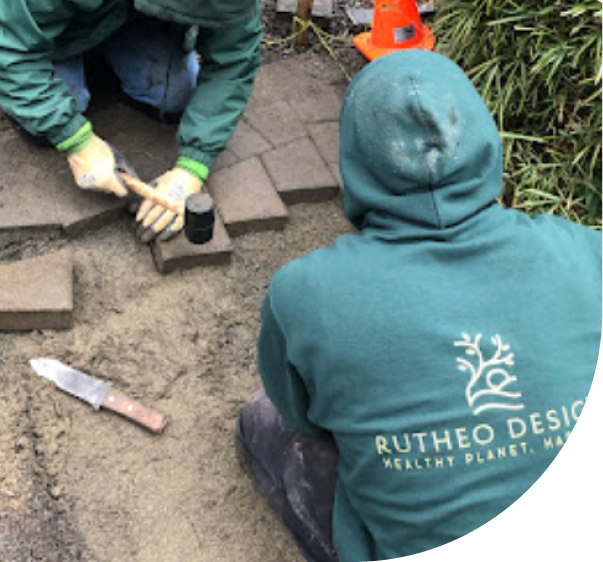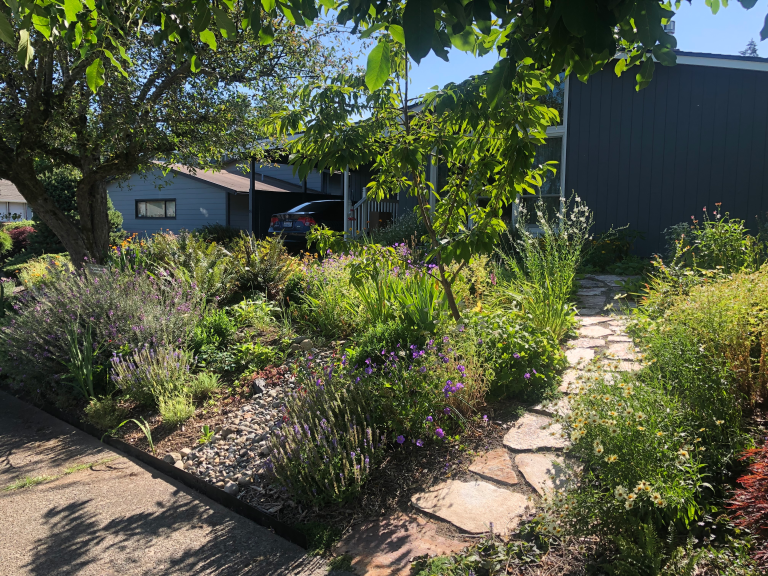
At Rutheo Designs, we craft edible gardens that thrive in Seattle’s unique climate—wet winters, dry summers, and a lush growing season. From raised beds and seasonal vegetables to orchards with pollinator plants, each design is tailored to your site, lifestyle, and food-growing goals. We prioritize native plants, organic soil-building, and water-wise irrigation to create productive, low-maintenance spaces.
Rooted in regenerative principles, our installations go beyond planting. We assess sun, soil, and microclimates, and add features like trellises, rainwater catchment, and deer-resistant fencing. Whether you’re just starting or expanding your edible landscape, we offer the expertise to make it thrive.
Designing an edible garden involves more than just putting food in the ground—it’s about creating a landscape that nourishes both the body and the ecosystem. Our approach combines productivity with visual appeal, ensuring that edible spaces are as beautiful as they are functional. We integrate vegetables, herbs, and fruiting plants into ornamental beds, native borders, and perennial plantings to create cohesive, multi-functional spaces. Every design considers form, texture, and seasonal interest alongside harvest potential.
To ensure year-round value, we balance perennials like rhubarb, blueberries, or culinary herbs with annual crops that can be rotated and refreshed. This mix provides structure, biodiversity, and yield over multiple seasons. Our plant palettes are chosen not only for taste and reliability but also for ecological support—favoring species that build soil, attract pollinators, and repel pests naturally. Design isn’t just about where things grow—it’s about how all those elements work together as a living system.
Seattle’s maritime climate presents both opportunities and challenges for edible gardening. We adapt planting strategies to account for our wet winters, cool springs, and dry summers by choosing varieties that can thrive with these seasonal extremes. Drainage and soil aeration become especially important in spring, while summer beds often need mulch and moisture-retentive soils to prevent drought stress.
To maximize our relatively short growing season, we often use heat-retentive materials like stone borders or south-facing walls to create microclimates that allow earlier planting and extended harvests. Protecting crops from urban wildlife is also essential—slugs, birds, deer, and raccoons are frequent visitors to food gardens in the region. We recommend integrated fencing, netting, and companion planting strategies that allow plants to thrive without resorting to synthetic deterrents.
Our edible gardens are built around soil regeneration. Compost, mulch, cover crops, and organic fertilizers form the foundation of fertility and plant health. We avoid synthetic inputs altogether and instead focus on improving long-term soil structure and nutrient cycling. Microbial life, fungal networks, and natural decomposition are central to our method—and we plan every planting with those systems in mind.
We also design with insect ecology in view. Pollinator strips, beneficial insect habitats, and low-disturbance maintenance schedules help create self-regulating food gardens that require less intervention over time. Tilling is avoided in favor of no-dig or low-till methods, which preserve soil structure and carbon content while reducing weed pressure and runoff.
Perennial crops form the backbone of a low-maintenance edible landscape. In the Seattle area, we prioritize species that thrive in our temperate climate and offer long-term productivity. Apple, pear, and plum trees are reliable fruit producers, while blueberries, raspberries, and currants deliver seasonal harvests with little input.
Other valuable perennials include asparagus, rhubarb, globe artichoke, and culinary herbs like oregano and thyme. These plants not only produce reliably over time but also provide structure and beauty, anchoring the garden throughout the seasons.
Annuals allow flexibility and seasonal abundance. We recommend a diverse selection of cool-weather crops such as kale, peas, lettuce, and chard for spring and fall planting. These are especially suited to our cooler spring temperatures and can be grown in succession to extend harvest windows.
In summer, heat-loving vegetables like tomatoes, beans, cucumbers, and squash thrive when placed in the warmest parts of the garden. We also design kitchen herb gardens that include commonly used staples—basil, parsley, rosemary, and thyme—arranged in spiral or grid layouts for beauty and accessibility.
Planning for year-round productivity means thinking ahead. We design planting calendars that stagger crops across spring, summer, and fall, allowing for smooth transitions and continual use of garden beds. This succession planting helps maximize yield while preventing gaps in production.
Crop rotation is essential to reduce pest and disease pressure and maintain soil nutrients. We group crops by family and rotate them seasonally to avoid depleting the same nutrients year after year. In winter or dormant seasons, we introduce cover crops like clover or vetch to restore organic matter and protect the soil. These living mulches also help suppress weeds and support beneficial insects, keeping the garden healthy and active even when it’s not in full production.

At Rutheo Designs, we are dedicated to transforming your outdoor spaces into beautiful, sustainable landscapes that reflect your vision and the unique character of the Seattle area. Whether you’re looking to enhance your garden with native plants, need expert advice on water-efficient irrigation systems, want to explore custom hardscaping for your outdoor living space, or discuss a comprehensive landscape design, our team is here to assist you every step of the way. We offer services in native plant landscaping, water-efficient irrigation, custom landscape design, and hardscaping solutions tailored to your goals and the local environment. Every project is unique, and we take the time to listen to your needs and offer personalized solutions that align with both your aspirations and Seattle’s natural surroundings.
We invite you to reach out to us to start the conversation about your landscaping needs. You can contact us by email at connect@rutheodesigns.com or give us a call at (360) 844-2989. Whether you have specific questions or are ready to schedule a consultation, we’re eager to help you bring your outdoor vision to life with the care and expertise that Rutheo Designs is known for.